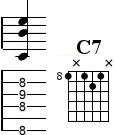Castrato - Clavier
 C - (Italian, French) "Do"; tone with a pitch frequency around 261.63 Hz; notation indicating common time or 4/4 time; Rt: Common-time
C - (Italian, French) "Do"; tone with a pitch frequency around 261.63 Hz; notation indicating common time or 4/4 time; Rt: Common-time
Cabaletta - (Italian) "horse"; a 19th century two part musical form favored for arias; the concluding section of an aria
Cabaret - a form of theatrical entertainment featuring music, song, dance, recitation, or drama normally held in nightclubs; venue form of stage entertainment stemming from 18th century France though use dates back to 12th century Belgium.
Cadence - the street-beat by percussion instruments in a marching band; a marching chant; harmonic configuration creating a sense of resolution;
Cadenza - (Italian) "cadence"; a short composition for performance by a solo virtuoso; a piece written for a soloist of extreme proficiency
Caesura - (Latin) "cut, hewn"; a metrical pause or break in a verse where one phrase ends and another phrase begins
Calando - (Italian) "becoming slower"; gradual decrease of tempo and volume
Calore - (Italian) "warmth"; play warmly or in a compassionate style
Calque - (French) "plainchant"; see plainsong or Gregorian chant
Calypso - a type of Caribbean folk song originating in the Trinidad region in the early 19th century usually witty or comical in nature in which local speech phrases are matched to an offbeat rhythm
Campanology - bell ringing; the practice of bell ringing
Cancrizans - (Latin) "walking backwards, crab-like"; a musical phrase which is simultaneously played in reverse by a second part; retrograde
Canon - (Latin) "law, norm"; musical composition from the Renaissance into the Baroque period utilizing overlapping imitative counterpoint
Cantando - (Italian) "singable"; 19th century playing style imitating human voice
Cantata - (Italian) "to sing"; vocal form with instrumental accompaniment used in 17th century Lutheran church services; sacred (religious) and secular (dramatic) forms of solo vocal performance with instrumental accompaniment
Cantibile - (Italian) "song-like"; playing style from the 19th century which imitates the human voice pitching the melody against the accompaniment; cantando
Canticle - (Latin) "song"; a religious hymn with biblical lyrics; psalm
Cantillation - (Hebrew) "to chant or sing"; chanting of prayers or scriptural texts practiced in Jewish and Christian churches dating back to the 7th-9th centuries.
Canto - (Italian) "song, to sing"; practice of singing the words of poems; poems divided into song lyrics for religious ceremonies
Cantor - the leading singer of Jewish and Christian rites
Cantus figuratus - (Latin) "figured song"; a musical term of medieval times referring to a polyphonic song with the notes exactly measured
Cantus mensuratus - (Latin) "measured song"; a musical term of medieval times referring to a polyphonic song with the notes exactly measured
Cantus musicus - (Latin) "musical song"; a musical term of medieval times which refers to polyphonic music
Cantus planus - (Latin) "plain song"; a group of chants or plainsong sung in litergies of the western church during the middle ages; see also Gregorian chant
Canzona - (Italian) "song, chanson"; lively and rhythmic 16th century Italian instrumental form derived from the French lyric driven chanson
Canzonet - (Italian) "song"; a popular secular vocal composition of dance-like character originating in mid 16th century Italy; canzonetta
Canzonetta - (Italian) "song"; a popular secular vocal composition of dance-like character originating in mid 16th century Italy; canzonet
Capriccio - (Italian) "whim, prank, caprice"; a fast freely moving musical form of the 16th & 17th centuries often referred to the madrigal
Capriccioso - (Italian) "capricious"; unpredicatable, volatile; unexpected
Carillon - a set of bells in a church tower; a group of bells
Carol - (French) "joyful song"; popular melodic dance songs from the 12th to 14th centuries; a festive song of modern times usually of celebratory or religious nature; as in Christmas carol or Carol of the Bells
Castrato - (Italian) "def"; a male singer who is castrated prior to puberty so that he retains a more soprano pitched voice of the 17th and 18th centuries; a soprano part sung by women or boys in modern times
Cavatina - (Italian) "short song"; a brilliant short type of aria sung in one or two sections without repeats developed in the 18th century as an operatic movement
Chamber Music - music of one performer to a part composed for an ensemble, usually a quartet, who could fit into a large room or palace chamber during the Medieval and Renaissance periods
Chamber Opera - a small-scale composition of the Renaissance with less than 25 performers for performance in a large room or chamber
Chamber Orchestra - a small-scale orchestra consisting of less than 50 musicians which perform in a large room or private chamber; see chamber opera
Change Ringing - a peal or loud ringing of specifically tuned bells in sequence by a team of ringers each with a single rope to a single bell of a carillion
Chanson - (French) "song"; monophonic lyric songs of France dating back to the 12th and 13th centuries and progressing into more secular polyphonic songs
Chant - (French) "to sing"; a ritualistic incantation of words and phrases by one or more voices, usually scriptural or religious in nature
Chanteur - (French) "male"; a male vocalist proficient in singing chansons
Chapel Master - the music director of a church and its choir
Charivari - (Latin) "rattling"; 19th century England practice of loudly banging pot and pans at a targeted subject for parades of local condemnation or celebration
Chest Voice - vocal ability of a powerful lower register of human voice;
Chiuso - (Italian) "closed"; instruction to stop or mute an instrument by placing a hand into the bell
Choir - a group of singers or an ensemble of vocalists, often religious in context; a body of singers who perform as a group; the music written for chorales
Choral - music pertaining to a choir's performance; music for choir
Chorale - (German) "choir music"; a German-Protestant hymn; compositions for performance by a choir in Protestant and Lutheran churches of Medieval times
 Chord - a group of three or more tones that sound good together; a group of tones with a harmonic sound; a tablature for strings indicating the chord or key, normally placed above the staff at the beginning; see written examples to right, see also arpeggio
Chord - a group of three or more tones that sound good together; a group of tones with a harmonic sound; a tablature for strings indicating the chord or key, normally placed above the staff at the beginning; see written examples to right, see also arpeggio
Chordophone - a classification of musical instruments which produce sound by way of vibrating strings stretched between two points; one of the main four groups of instrument classification established by Hornbostel-Sachs in 1914
Chorister - (German) "singer"; someone who like to sing; the music leader of a church, choir, or religious ensemble
Chorus - (Greek) "to sing or speak"; (original) the ancient Greek narrator or spokesman that speaks the introduction to a play; (modern) an ensemble of singers who accompany an orchestra or opera; the interval of a song repeated after each verse which normally states the theme or main idea of the song
Chromatic - (Greek) "colored"; 12 tone scale composed of semitones of no particular key; colorful; chromatically altered chords which satisfy the composition or style of composing
Chromatics - (Greek) "color"; the frequent use of accidentals; the study of color
Clapper - the tongue inside of a bell which strikes the sides to produce its ring
Clapping Music - a minimalist composition for two performers performed entirely by clapping; a 1972 piece written by Steve Reich performed by clapping
Claque - a person or group paid to applaud a performance originating in early 19th century French theatre and opera which expanded into Italy and beyond
Clarion - the Medieval term for 'trumpet'; register of a clarinet ranging from B4 to C6; a trumpet organ stop which plays an octave higher than its unison
Class Act - a performance of classical music of extreme expression
Classical - orchestral art music of the period from about 1750 to 1830; music distinguished from other styles by use of contrasting keys, ornamentation, and instrumentation with strict expressive performance requirements
Clavicembalo - (Italian) "key dulcimer"; alternative name for the harpsichord
Clavier - (Latin) "key"; general term for keyboard, piano, harpsichord, etc.


